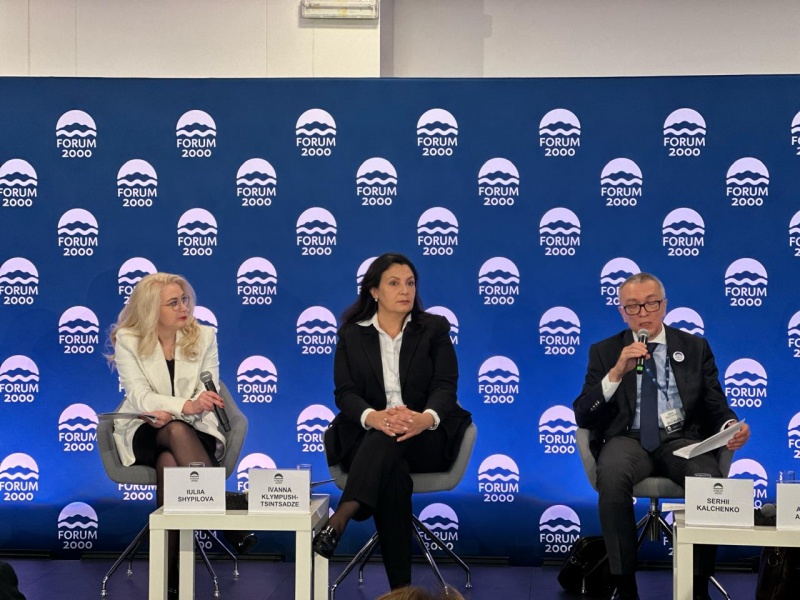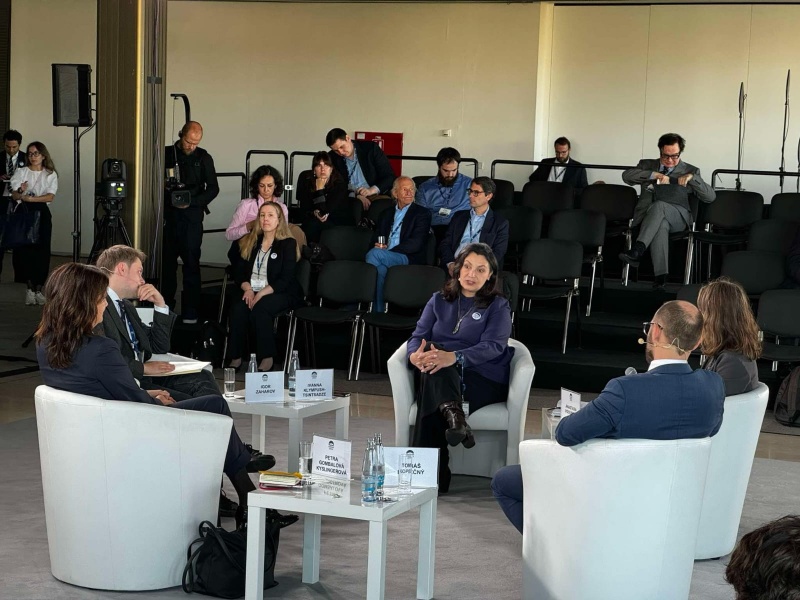
The Chairwoman of the Committee on Ukraine’s Integration into the EU Ivanna Klympush-Tsintsadze took part in the Forum 2000. She participated in discussions about Ukraine’s needs, the impact of the war on Europe and the world, the efforts of MPs to establish effective mechanisms for holding Russia accountable, the functioning of the Parliament during wartime, and Ukraine’s European integration.
The Chair of the Committee emphasised that wars are not won with doubts, half-measures, or a lack of a clear goal. “We must recognise that there are no half-tones. Either the autocracies win and impose their agenda on the world community, or a united West prevails. If Russia is not stopped and defeated, the outcome of Russia’s war against Ukraine will determine the future not only of Europe but of the entire world,” said Ivanna Klympush-Tsintsadze. She described Russia as behaving like a thug with an axe fighting a musketeer with a sword. And as the thugs raise new axes, seconds are standing beside the musketeer and checking if he observes the rules of engagement. She warned that if the world allows Russia to win, this could trigger a domino effect of new military conflicts in various regions. Despite its military and economic strength, compared to the authoritarian regimes led by Russia, the West has not yet made a final decision on the need to defeat Russia. "The West must decide that Russia must be defeated in the war. Once that decision is made, everything must be done for victory,” stressed the Committee Chair.
Discussing Parliament’s role in wartime, Ivanna Klympush-Tsintsadze noted that there are certain justified restrictions on the functioning of democratic institutions. ”Any war poses a threat to democracy. It is important to find that fragile balance between the interests of national security and protecting citizens’ rights and freedoms,” the Committee Chair said. She noted that it is extremely important that the Parliament continues to operate during the war. In the first months of the full-scale invasion, the work of the Verkhovna Rada was coordinated as a single organism, where everyone heard each other and decided by consensus on critical national issues. “We can be proud of how the Parliament acted then. However, now we need to find a way, in the absence of elections, to at least partially restore trust in governmental institutions. And this, in my opinion, requires the establishment of a de-facto new coalition, forming a government of national unity. This requires honesty in the dialogue,” said Ivanna Klympush-Tsintsadze. She noted that it is crucial to resume at least the “Question Hour to the Government”. “It is good that the first step towards the return of journalists to the Rada has also been taken, but this is currently only a facade that has little to do with the real work of journalists in the Parliament, as it used to be before the introduction of martial law,” said the Chair of the Committee. According to her, the longer the war continues, the greater the temptation to neglect the democratic principles of the society and the country under the pretext of security.

Regarding European integration, Ivanna Klympush-Tsintsadze expressed hope that the incredible opportunities presented by opening negotiations on Ukraine’s EU membership would enable collaboration with European partners to ensure compliance with the foundations of democratic and balanced governance in Ukraine. She also noted that opportunities should be created to involve society in discussing European integration and making it aware of legislative changes at the parliamentary level. “We must communicate with the broad public and civil society, involve them in dialogue and collaborate on drafting laws proactively rather than inform post-factum. We must explain our work to our citizens to maintain the enormous support for European integration that exists in society today. This requires an honest dialogue with society, not unrealistic promises,” said the Committee Chair.
The Chair of the Committee emphasised that wars are not won with doubts, half-measures, or a lack of a clear goal. “We must recognise that there are no half-tones. Either the autocracies win and impose their agenda on the world community, or a united West prevails. If Russia is not stopped and defeated, the outcome of Russia’s war against Ukraine will determine the future not only of Europe but of the entire world,” said Ivanna Klympush-Tsintsadze. She described Russia as behaving like a thug with an axe fighting a musketeer with a sword. And as the thugs raise new axes, seconds are standing beside the musketeer and checking if he observes the rules of engagement. She warned that if the world allows Russia to win, this could trigger a domino effect of new military conflicts in various regions. Despite its military and economic strength, compared to the authoritarian regimes led by Russia, the West has not yet made a final decision on the need to defeat Russia. "The West must decide that Russia must be defeated in the war. Once that decision is made, everything must be done for victory,” stressed the Committee Chair.
Discussing Parliament’s role in wartime, Ivanna Klympush-Tsintsadze noted that there are certain justified restrictions on the functioning of democratic institutions. ”Any war poses a threat to democracy. It is important to find that fragile balance between the interests of national security and protecting citizens’ rights and freedoms,” the Committee Chair said. She noted that it is extremely important that the Parliament continues to operate during the war. In the first months of the full-scale invasion, the work of the Verkhovna Rada was coordinated as a single organism, where everyone heard each other and decided by consensus on critical national issues. “We can be proud of how the Parliament acted then. However, now we need to find a way, in the absence of elections, to at least partially restore trust in governmental institutions. And this, in my opinion, requires the establishment of a de-facto new coalition, forming a government of national unity. This requires honesty in the dialogue,” said Ivanna Klympush-Tsintsadze. She noted that it is crucial to resume at least the “Question Hour to the Government”. “It is good that the first step towards the return of journalists to the Rada has also been taken, but this is currently only a facade that has little to do with the real work of journalists in the Parliament, as it used to be before the introduction of martial law,” said the Chair of the Committee. According to her, the longer the war continues, the greater the temptation to neglect the democratic principles of the society and the country under the pretext of security.

Regarding European integration, Ivanna Klympush-Tsintsadze expressed hope that the incredible opportunities presented by opening negotiations on Ukraine’s EU membership would enable collaboration with European partners to ensure compliance with the foundations of democratic and balanced governance in Ukraine. She also noted that opportunities should be created to involve society in discussing European integration and making it aware of legislative changes at the parliamentary level. “We must communicate with the broad public and civil society, involve them in dialogue and collaborate on drafting laws proactively rather than inform post-factum. We must explain our work to our citizens to maintain the enormous support for European integration that exists in society today. This requires an honest dialogue with society, not unrealistic promises,” said the Committee Chair.
More posts by topic
“News”
24 November 2025 13:08
20 November 2025 16:14
18 November 2025 12:57
13 November 2025 12:34
12 November 2025 12:31
09 November 2025 12:27
17 October 2025 16:54
15 October 2025 16:52
13 October 2025 16:50
10 October 2025 16:47